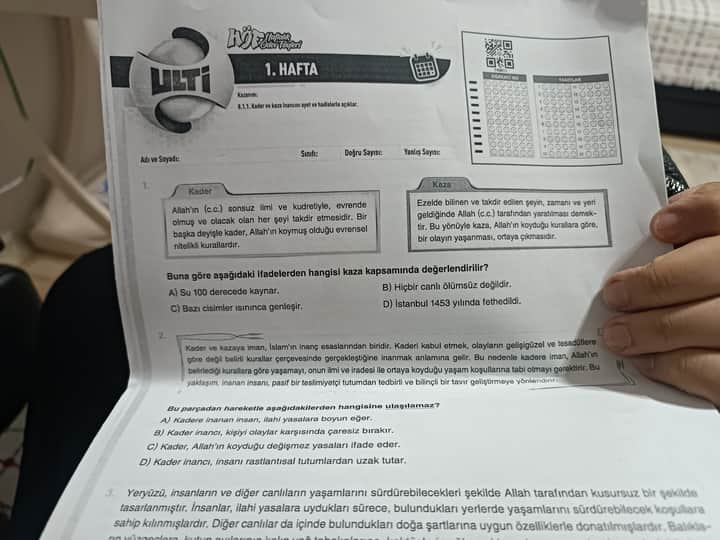Züleyha_Elif_Özbey’s Request for Help
Answer:
Let’s analyze the worksheet shown in the image shared by Züleyha_Elif_Özbey and provide assistance accordingly.
-
Question on Destiny and Free Will (Kader and Kaza)
- The worksheet discusses the concepts of Kader (Destiny) and Kaza (Free Will) in Islamic theology.
- It asks, “Buna göre aşağıdaki ifadelerden hangisi kaza kapsamında değerlendirilir?” which means “According to this, which of the following statements can be considered within the scope of kaza (free will)?”
-
Choices Provided:
- A) Su 100 derecede kaynar. (Water boils at 100 degrees.)
- B) Hiçbir canlı ölümsüz değildir. (No living being is immortal.)
- C) Bazı canlılar uçar. (Some living beings can fly.)
- D) İstanbul 1453 yılında fethedildi. (Istanbul was conquered in 1453.)
Analysis:
- Kader (Destiny): Refers to pre-determined events by Allah (c.c.), such as natural laws (e.g., water boiling at 100 degrees) and general truths (e.g., no living being is immortal).
- Kaza (Free Will): Refers to actions that happen due to human decisions and effort (e.g., conquering a city).
Answer to the Question:
Among the given choices, the event that falls under kaza (free will) is:
- D) İstanbul 1453 yılında fethedildi. (Istanbul was conquered in 1453.)
Because this event resulted from human effort and decision-making.
- Another Question on Inclinations towards Negative Behavior
- It asks, “Buna göre aşağıdaki tutumlardan hangisine ulaşılmaz?” which means “According to this, which of the following attitudes cannot be achieved?”
- The choices are about attitudes that align with behaving within moral and ethical standards or avoiding them.
Based on the content provided in the image:
- The correct answer would signify behavior that doesn’t align with keeping oneself within the limits set by moral teachings.
Therefore, a detailed understanding of the context given in the worksheet is crucial for answering the questions.
If you need further assistance with other parts of the worksheet, feel free to ask!
